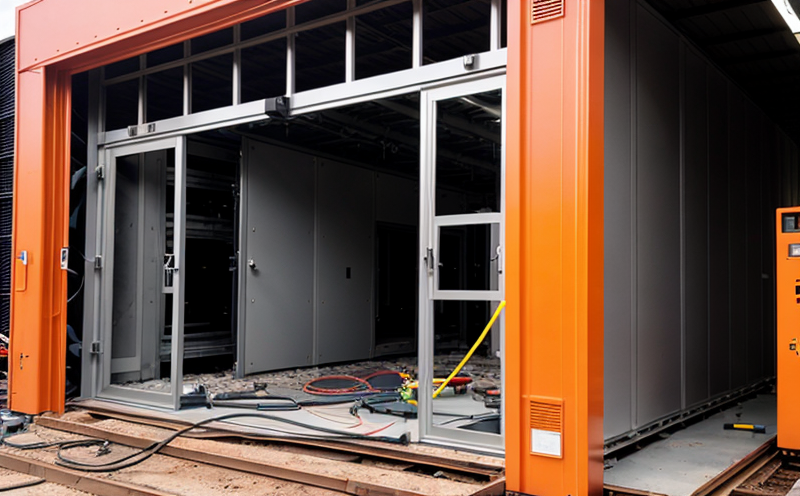DIN 40740 Thermal Safety Testing of Stationary Nickel-Cadmium Batteries
The DIN 40740 standard is a critical guideline in ensuring the safety and reliability of stationary nickel-cadmium (NiCd) batteries. These batteries are widely used in various sectors, including telecommunications, power backup systems, and medical devices, where thermal stability and safety are paramount.
Thermal runaway can pose significant risks to battery performance, as well as to personnel and equipment. DIN 40740 addresses these concerns by providing detailed procedures for testing the thermal stability of NiCd batteries under various stress conditions. This standard ensures that manufacturers can design products that meet stringent safety requirements, thereby reducing the risk of fire or explosion.
The testing process involves subjecting the battery to a series of controlled temperature excursions, monitoring its response, and evaluating potential hazards. The apparatus used in this test includes specialized chambers capable of maintaining precise temperature settings and recording data accurately. Compliance with DIN 40740 is essential for manufacturers aiming to meet international safety standards.
Understanding the importance of thermal stability also involves recognizing how these batteries behave under extreme conditions. Nickel-cadmium batteries, despite their advantages in terms of energy density and long cycle life, can exhibit a phenomenon known as "thermal runaway" when exposed to excessive heat or electrical stress. This condition occurs when internal temperatures rise uncontrollably, leading to potential damage or failure.
DIN 40740 provides specific guidelines on how to prevent such incidents by conducting thorough thermal testing. The standard outlines the steps for preparing specimens, setting up test conditions, and analyzing results. These procedures ensure that any issues related to thermal stability are identified early in the development process, allowing manufacturers to make necessary adjustments before product release.
The importance of this testing cannot be overstated, especially given the increasing demand for safer battery solutions across various industries. By adhering to DIN 40740, companies can enhance their reputation as leaders in quality and safety while also ensuring compliance with regulatory requirements worldwide.
- Customer Impact: Ensures safe operation of critical infrastructure such as power backup systems and medical devices.
- Safety Assurance: Reduces the risk of battery-related incidents, protecting personnel and equipment.
- Compliance: Facilitates adherence to international safety standards, enhancing market access for products.
In summary, DIN 40740 Thermal Safety Testing is a crucial step in ensuring the safe and reliable performance of stationary nickel-cadmium batteries. By following this standard, manufacturers can design products that meet stringent safety requirements, thereby reducing risks associated with thermal runaway.
Why It Matters
Thermal stability testing under DIN 40740 is vital for several reasons. First and foremost, it ensures the safe operation of critical infrastructure, such as power backup systems used in telecommunications and data centers. In these environments, even a minor incident could lead to significant disruption or loss. By adhering to this standard, manufacturers can significantly reduce the risk of such events.
Secondly, compliance with DIN 40740 helps protect personnel and equipment from potential hazards associated with battery failures. Nickel-cadmium batteries, while robust, are not immune to thermal runaway if exposed to excessive heat or electrical stress. By conducting thorough testing according to this standard, manufacturers can identify and address any issues early in the development process.
Finally, meeting international safety standards through DIN 40740 enhances a company's reputation for quality and reliability. This is particularly important in competitive markets where compliance with global regulations is essential for market access. By ensuring that all products meet stringent safety criteria, companies can build trust with their customers and regulators.
In conclusion, thermal stability testing under DIN 40740 is not just a technical requirement but also a strategic decision that impacts operational efficiency, personnel safety, and market reputation. Investing in this testing process yields long-term benefits for both manufacturers and end-users.
Eurolab Advantages
At Eurolab, we offer unparalleled expertise and state-of-the-art facilities dedicated to DIN 40740 Thermal Safety Testing of Stationary Nickel-Cadmium Batteries. Our team of certified professionals ensures that every test is conducted with precision and accuracy, adhering strictly to the latest international standards.
Our advanced testing equipment allows us to simulate real-world conditions accurately, providing reliable data for analysis. This capability enables manufacturers to make informed decisions about design improvements and material choices based on empirical evidence rather than assumptions.
We pride ourselves on offering comprehensive support throughout the entire testing process, from initial consultation to final report delivery. Our commitment to quality is reflected in our unwavering attention to detail and relentless pursuit of excellence. Whether you need assistance with specimen preparation or interpretation of results, our dedicated staff is here to help.
Moreover, Eurolab's extensive experience and network within the industry ensure that we stay ahead of emerging trends and regulatory changes. This proactive approach allows us to provide clients with cutting-edge testing solutions tailored specifically to their needs.
In summary, choosing Eurolab for DIN 40740 Thermal Safety Testing means partnering with a leader in quality assurance who understands both the technical nuances and broader implications of this important standard.





